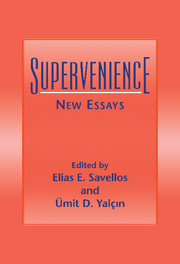Book contents
- Frontmatter
- Contents
- List of Contributors
- Introduction
- Varieties of Supervenience
- Supervenience: Model Theory of Metaphysics?
- “Global” Supervenient Determination: Too Permissive?
- Weak Supervenience Supervenes
- The Tweedledum and Tweedledee of Supervenience
- Reduction in the Mind of God
- Psychophysical Supervenience, Dependency, and Reduction
- Supervenience Redux
- Nonreducible Supervenient Causation
- Physicalism, Supervenience, and Dependence
- An Argument for Strong Supervenience
- Arguments for Supervenience and Physical Realization
- Supervenience and the Essences of Events
- How Does Ontology Supervene on What There Is?
- Supervenience and Intentionality
- Supervenience, Coherence, and Trustworthiness
- Does Truth Supervene on Evidence?
- Index
Varieties of Supervenience
Published online by Cambridge University Press: 29 March 2010
- Frontmatter
- Contents
- List of Contributors
- Introduction
- Varieties of Supervenience
- Supervenience: Model Theory of Metaphysics?
- “Global” Supervenient Determination: Too Permissive?
- Weak Supervenience Supervenes
- The Tweedledum and Tweedledee of Supervenience
- Reduction in the Mind of God
- Psychophysical Supervenience, Dependency, and Reduction
- Supervenience Redux
- Nonreducible Supervenient Causation
- Physicalism, Supervenience, and Dependence
- An Argument for Strong Supervenience
- Arguments for Supervenience and Physical Realization
- Supervenience and the Essences of Events
- How Does Ontology Supervene on What There Is?
- Supervenience and Intentionality
- Supervenience, Coherence, and Trustworthiness
- Does Truth Supervene on Evidence?
- Index
Summary
In recent years, supervenience has been the subject of extensive philosophical analysis. Varieties of supervenience have been distinguished, their pairwise logical relationships examined, and their usefulness for various purposes scrutinized. However, despite extensive analysis, some details are askew, some controversies unresolved. I will by no means attempt to straighten out all the details or to settle all the controversies. But I will take a detailed look at what others have said and add a couple of wrinkles.
In Section 1, I present and explore the core intuitive idea of supervenience. In Section 2, I argue that the possible-world versions of weak and strong supervenience do not imply, respectively, the modal-operator versions of weak and strong. In Section 3, I discuss an aspect of global supervenience, in particular what it is for two worlds to have the same total pattern of distribution of properties of a certain sort. In Section 4, I examine the logical relationships between weak and global supervenience, and between strong and global. In Section 5, I make some observations about multiple-domain weak and strong supervenience. In Section 6, I consider whether any variety of supervenience implies reduction. Finally, in Section 7, I briefly note two theoretical uses of supervenience.
- Type
- Chapter
- Information
- SupervenienceNew Essays, pp. 16 - 59Publisher: Cambridge University PressPrint publication year: 1995
- 57
- Cited by



